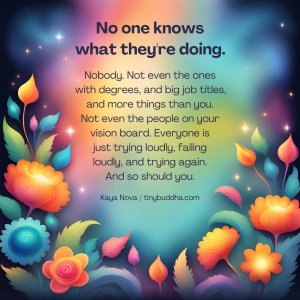
“How people treat you is their karma; how you react is yours.” ~Dr. Wayne Dyer
I was the quintessential late-bloomer, not hitting my growth spurt until my junior year of high school. I’m six feet tall now, but for all of middle school and the first half of high school, I was one of the shortest kids in the entire school.
Additionally, some thought I had a slight lisp. I was extremely self-conscious about it after a few people unkindly pointed it out to me. During my senior year I wore Invisalign braces, which corrected my teeth and improved by speech mannerisms, but for many years I was embarrassed about my pronunciation of certain words.
I was frequently bullied for how short I was and the way I spoke. Since I had low self-esteem already, I felt like I was fundamentally flawed and unworthy as a person. It’s safe to say high school was an extremely difficult time.
When I went to a small liberal arts school called McDaniel College down in Westminster, Maryland, I was ready to start over. I was especially looking forward to meeting new people and leaving the days of being bullied behind. That’s when I met Tom (name changed to protect his privacy).
The Worst Bully I Ever Had to Face
Tom was on my college baseball team. He was the meanest, nastiest, cruelest bully I’ve ever had to face in my life.
Tom hated my guts, and to this day I don’t know why. I’m an analytical and observant person, so here’s my educated guess: One of my values is kindness, so when I meet people I’m friendly. Perhaps Tom didn’t think I was one of the cool kids because I was “too nice.”
Tom hung around fellow bullies, people who enjoyed making fun of people. There’s nothing Tom enjoyed more than disrespecting others and making them feel unworthy, it seemed, perhaps because it made him feel better about himself.
Tom didn’t bully me for my height or for the way I spoke; he bullied me because of my general lack of confidence. I was afraid of him, and he knew it.
At one party, he told me to go hide in the closet. At another party, he made me feel so unwelcome and embarrassed that I left the party. At the gym once, he purposely bumped into me in an aggressive way and then walked away.
Why did I do nothing while he treated me like this?
Two main reasons: One, no one ever taught me how to properly stand up for myself. I did not have the skills, tools, or know-how to assert myself. Two, during my senior year of high school I came incredibly close to committing suicide. There was still a part of me wondering if I belonged on this planet.
I had acne that wouldn’t go away, and because I didn’t like myself, I subconsciously thought maybe I deserved to be treated like garbage. Ridiculous, I know, but my self-esteem was low at that point in my life. Bullies like Tom prey on people with low self-esteem, and I was his prime target.
I stopped going to any baseball parties or social functions. I sat in my room by myself on Friday and Saturday nights. While my teammates were partying, I was letting my social anxiety get the best of me.
My anxiety ran sky-high when the thought of Tom crossed my mind. I was letting this one person dominate my life. I became depressed because I never would have expected bullying to continue into college. I wondered if things would ever get better.
The Silver Lining
After some dark and isolated nights—made easier thanks to phone calls with my awesome younger, Annemarie—I realized I had to stop letting Tom ruin my college experience. I started to introduce myself to other people on the campus. I joined other groups, and made all sorts of new friends.
I only saw Tom and the rest of my baseball teammates during a practice, game, or mandatory team function. Many of the other players on the team looked up to Tom as the leader of the pack, the tough guy they admired, so they weren’t people I felt comfortable being around.
While I chose McDaniel College to continue my baseball career, I decided to stop spending time with people who didn’t think highly of me whenever I could. I made many great friends at my college, and very few of them were on the baseball team.
I ended up having a great college experience because of this. If not for my experience with Tom, I may not have extended my social circle that far.
So I have two words for Tom: thank you. Thank you for redirecting me toward kinder, more loving people. Thank you for giving me the motivation to introduce myself to new people instead of limiting myself to some silly clique.
Eventually, some of the other players on the team noticed how many people I knew at the school. A few them even said I was popular. I realized something profound then: When you are rejected by a person or group of people, life has given you an opportunity to expand your horizons, meet new people, and make new friends.
My senior year of college, with my confidence finally starting to rise, I had the guts to go tailgate with my baseball teammates during a school football game. Tom punched me square in the face and then immediately left before I had a chance to say or do anything.
A week later, I saw him at the library. Rather than retaliate or seek revenge, I asked to have a discussion with him, and he agreed.
He told me he’d punched me because I was drinking his friend’s beer—the beer that was supposedly for all the players on the baseball team, except for me, that is. I was the only one on the team harassed for this.
Tom went on to say that during freshman year he didn’t think I was one of the cool kids. He explained that he didn’t hate me as a person, but he didn’t agree with a lot of the things I did.
“Everyone has their own opinions,” he said. I had no idea what he meant, as my freshman year of college I was always kind and respectful to others, but rather than inquire further into his inner world, I kept the discussion brief. More than anything else, I was glad the feud was likely coming to an end.
I don’t know what made Tom become kinder than usual in this final conversation of ours, but as we made eye contact he could see the big black eye he gave me. He didn’t outright apologize to me, but he clearly felt sorry for what he did. His words and actions were conciliatory.
Perhaps he respected that I had just spent two semesters abroad, studying at McDaniel’s satellite campus in Budapest, Hungary, as he did mention my travels in our discussion. He probably realized I’d made the most of my opportunities and had an enriching college experience, despite his continual and incessant disrespect.
To my surprise, he ended the conversation by shaking my hand. We then peacefully went our separate ways. By that point he had quit the baseball team and I no longer had to see him every day. He never bothered me again.
How to Move Beyond Bullying
Dealing with bullying is never easy or pleasant, but it comes with the territory of being human. Bullying happens not only on sports teams and in schools, but also in the workplace and other organizations. I hope these tips will help you deal with the cruel people in your life and come out on top.
Have Compassion
It can be difficult to have compassion for your bullies, but it helps to remember that hurt people, hurt people.
Bullies want to make you think there is something wrong with you. The truth is there is nothing wrong with you, and they’re the ones with the problem. Deep down inside they feel scared and unworthy, and they believe the only way to build themselves up is to tear someone else down.
Truly feel badly for people like this. As I recently learned from my friend Evan Carmichael during a YouTube live discussion with him, this does not mean you must say out loud that you have compassion for them. It’s something you can do within your mind, heart, and soul. Practicing compassion makes it easier to not take things personally, and to not react emotionally.
Don’t Let Their Opinion Define Your Reality
Tom thought I wasn’t worth hanging out with, but the truth is I have a lot to offer people. Despite Tom’s opinion of me, I ended up making plenty of friends.
In what parts of your life are you letting cruel naysayers limit you? You are not defined by what other people think; you are defined by your actions and what you think of yourself.
Don’t let a bully change the way you view yourself. The next time a bully says something to you that isn’t true, pause. Then calmly say, Oh, really? Shrug your shoulders and move on with your day. The bully will most likely be neutralized.
They are looking to get a reaction out of you and feed off your defensiveness. When you show them that their opinion means little to you, they tend to leave you alone.
Meet New People
A bully is one person. There are lots of great people out there in the world for you to meet. Don’t let one bad egg, or a few bad eggs, spoil the bunch.
If you are in school, join other groups that interest you. If you are in the workplace, attend networking events and other kinds of social outings outside of work each month. The person who will change your life in a positive way is one step beyond your biggest doubt. Don’t be afraid to get outside your comfort zone because it will show you that the world is filled with awesome people.
Talk to a Close Friend or Family Member
When I was all alone on a Saturday night in my dorm room, isolated from my teammates, and before I met new people at my college, talking to my sister on the phone helped to remind me of all that was good about me and my life.
You are only alone if you choose to be alone. Reach out to a trusted friend or family member you feel comfortable with and vent your innermost thoughts and feelings to them. It feels good to have a listening ear, someone who reminds us of our value. Sometimes we get so caught up in our problems that we forget about the wonderful person we are.
Don’t Cross the Line Just Because They Do
My sophomore year of college, while I was drunk, without thinking I went to Tom’s dorm room with a friend, knocked on the door, and went in. It was confrontational, but more than anything else it was an insecure “let’s be friends” kind of thing.
My incoherence, coupled with the fact that he really didn’t like me, made this a really bad and immature idea. By doing this, I opened up old wounds. His inexcusable actions were definitely on him, but it was not the right time and I was not in the right state to talk to him. We didn’t get into a fight that night, and he was actually pretty calm in the moment, but it gave him more incentive to bully me in the future, since I’d invaded his private space.
Remember that just because someone else crosses the line that doesn’t mean you have to cross it as well. You’re not responsible for what someone else does to you, but you are responsible for how you respond to it.
Assert Yourself Without Overreacting
When dealing with a bully who won’t leave you alone, sometimes you need to assert yourself without overreacting. To respond in an even-keeled way, focus on asserting how you feel. Use “I” statements rather than “you” statements as much as you can.
When you accuse the bully, it will egg them on to keep going. But when you focus on how you feel, it will point out to the bully that they’ve crossed the line. Here are some examples. Try to do this during one-on-one conversations, but say it in the moment if necessary:
- I don’t like the disrespect. Please stop.
- I feel frustrated that I’m not getting my space. I’m not getting any respect.
- I don’t like how our conversations are always one-sided. I need to share my thoughts too.
- I don’t deserve this. I deserve better.
- I’m not happy with this. The negativity is pointless. Stop it, or we’re done.
These tactics did not work with Tom for many years, but they might work with a less extreme bully.
Send Them Love and Forgiveness
The late, great Susan Jeffers created an exercise I absolutely love. When you are alone, imagine the bully you are dealing with as a child. Surround them with light and love, and repeat in your mind, I send them love, I send them love, I send them love.
I was so afraid of Tom that he became a monster in my mind, dictating my actions around my college campus for a while. The truth is, he is a person like the rest of us, and something went seriously wrong in his upbringing. You don’t know what the bully has been through; they’ve become this way because they are hurting on the inside. Send them love and forgiveness.
Go to the Authorities When Needed
Be the bigger person, but only do so up to your limits. After Tom physically attacked me with a strong punch that left me with a bruised eye, I was at my limit. In one last attempt to end it, I peacefully confronted him face-to-face, and it worked.
I don’t believe in retaliation or violence, so I stuck to my values even after he physically hurt me. With that said, if he attacked or threatened me even one more time, I would have gone to my coach and the campus authorities.
When a bully turns into a criminal, please do not ever be afraid to take action. The bully wants you to live in a prison of fear, but when they see you will not tolerate their actions, they will stop. The last resort before turning it over to the authorities is to tell them directly, “If this doesn’t stop, I’m going to [person in position of authority].”
They may try to make you feel like less of a person for doing this, but remember that their opinion doesn’t matter. All that matters is that you do what you need to do to find a solution.
Putting It All Together
Bullying is an international epidemic, and it needs to stop. But before the world comes to its senses, we’re going to have to learn how to deal with nasty, difficult people.
The truth is we can’t control how other people act, but we can control how we respond to those other people. By sending our bullies compassion, asserting ourselves, and choosing not to be defined by their opinions, we can create a happy ending for ourselves.
The experience itself may be a nightmare, but you can peacefully move on with your life knowing you are a person of integrity and values.
You can move beyond the bullying you are experiencing, or have already experienced. You can find the silver lining and come out on top.
About Jeff Davis
Jeff Davis is a professional speaker and the author of several books. He has done keynote speeches internationally and is a sought-after expert on self-leadership, anti-bullying, and overcoming adversity. Jeff frequently speaks to high schools, colleges, nonprofits, organizations, associations, conferences, and businesses. He’s been to five different continents and has a Master’s degree from Johns Hopkins Carey Business School.













 Though I run this site, it is not mine. It's ours. It's not about me. It's about us. Your stories and your wisdom are just as meaningful as mine.
Though I run this site, it is not mine. It's ours. It's not about me. It's about us. Your stories and your wisdom are just as meaningful as mine. 